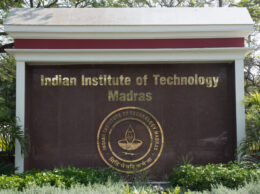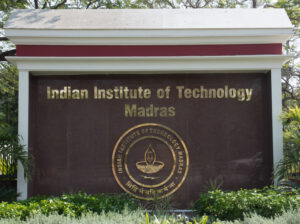TADEPALLIGUDEM, ANDHRA PRADESH : National Institute of Technology Andhra Pradesh, an ‘Institute of National Importance,’ conducted its Second and Third Convocation today (13th November 2021) in physical mode. A total of 381 candidates of 2016-20 Batch and 412 candidates of 2017-21 Batch were awarded degrees during the occasion
Mr. Karthik Reddy, a student of Department of Mechanical Engineering, was the Institute Topper and Gold Medalist Winner of the 2016-20 Batch. Ms. B. Anusha, a student of Department of Electronics and Communication Engineering, was the topper of the 2017-21 Batch.
Upon Graduation of the third batch this year (2021-22), NIT Andhra Pradesh will qualify to apply for Rankings under the National Institutional Ranking Framework (NIRF), established by Ministry of Education, Government of India. The Institute is working towards getting its programs accredited by national and international accreditation bodies such as National Board of Accreditation (NBA). The Institute is also in process of initiating an MBA programme from the next academic year.
Delivering the Convocation Address, Chief Guest Dr. G. Satheesh Reddy, Chairman, Defence Research and Development Organization (DRDO), said, “Innovation has become one of the important tools today. A product, unless it is innovative, is very difficult for the world to accept today. Academic Institutions like NITs are the engines of innovations… The seeds for innovations have to come right from the academic institutions. That is why we have started many courses in Defence Technologies in the Academic Institutes.”
Further, Dr. Satheesh Reddy said, “We need to develop lot of technologies and for that, the core research of Technology Development happens in Academic Institutions in the entire world. The Seeds of Technology Development have come from Academic Institutions…We are started, in more than 40 academic institutions in the country, the MTech Courses in Defence Technologies. We have also tied up with Department of Higher Education where 500 PhD students are sponsored in DRDO laboratories to work on defence problems.”
Dr. Satheesh Reddy added, “The Number of Startups which have been registered DPIIT (Department for Promotion of Industry and Internal Trade) is more than 56,000. Youngsters are coming up with a number of startup ideas today. There are many startups that are working in defence technology ideas, which we have never seen. This is a trend change in the last four-five years. These startups are working on materials, composites, engines, propulsions and core technologies which are required for Defence. The Ministry of Defence and Government of India are encouraging this trend in a big way. Many schemes have been created.”
DRDO has set up specific schemes for encouraging young entrepreneurs and start-ups – the Technology Development Fund and the Dare to Dream scheme. The Organization will provide grants/funding and test facilities as part of these schemes.
Speaking earlier, Guest of Honour Dr. Dasarath Ram Yadav, Director, Defence Research and Development Laboratory (DRDL), said, “There are several initiatives by the Government of India and the Hon’ble Prime Minister of India Shri Narendra Modi to foster innovation in young minds by providing right environment and encouragements for start-ups by establishing incubation centres for translational research such as Centre of Excellence, National Centre for Additive Manufacturing at Hyderabad, Research Parks at IIT Madras, IIT Bombay and IIT Kharagpur, among others.”
Dr. Dasarath Ram Yadav told the students, “As youths of this country, you are going to be the drivers of our economy and development. Lot of multinational companies are being headed by Indians who have graduated from IITs, NITs, IIMs and other premier institutions in India. When we could excel in other countries, why not we can create organizations like Apple, Microsoft, Facebook, Google at India?”
Dr. Dasarath Ram Yadav added, “I urge you, the graduating students, to make use of various initiatives by Government of India towards Atma Nirbhar Bharat, the vision of the Hon’ble Prime Minister Shri Narendra Modi for making India a self-reliant nation to become entrepreneurs and create jobs.”
NIT Andra Pradesh encourages the innovative ideas of students and faculty. Two such innovative contributions from its Faculty members are – development of Wi-Fi controller for smart rainwater harvesting and a protocol to address security in Electric Vehicles charging, which drew huge appreciation from across the country
Speaking earlier, Ms. Mridula Ramesh, Chairperson, Board of Governors, NIT Andhra Pradesh, said, “While the pandemic raged, the world of work has changed. Digitization and e-commerce have taken off. The world, as it always has, is continuing to change. Only now, in the past few years, the change is accelerating. From now on, periodically in your life, there will be change when you will be asked to make a choice. Understanding yourself – this Atma Gnana – will help you make the choice that brings you Atma Nirbharta. ”
NIT Andhra Pradesh has embraced the National Education Policy (NEP-2020). The institute had organized ten virtual talks on the various aspects encompassing the salient features of NEP 2020 for its faculty other institutes as well. The resource persons included the Cabinet Ministers, Members of Parliament, Academicians and policymakers across the country
Delivering a report on the progress made by the Institute, Prof. C.S.P. Rao, Director, NIT Andhra Pradesh, said, “It is heartening to note that in these two graduating batches, the placement percentage has reached 78.82 per cent for the 2016-2020 batch and 84.80 per cent for the 2017 – 2021 batch respectively. NIT Andhra Pradesh has not allowed the pandemic to disturb our academic commitments. Our institute has quickly adapted to the changing education system and moved ahead with the academic activities without going to a hiatus.”
Further, Prof. C.S.P. Rao said, “The year 2020 was a monumental year in the history of NIT Andhra Pradesh. The first batch of M.Tech admitted during September 2020 have reported to the campus physically by the end of December 2020. We have organized a virtual induction programme for 2020 batch, and the first-year students have adapted to the institute’s system.”








